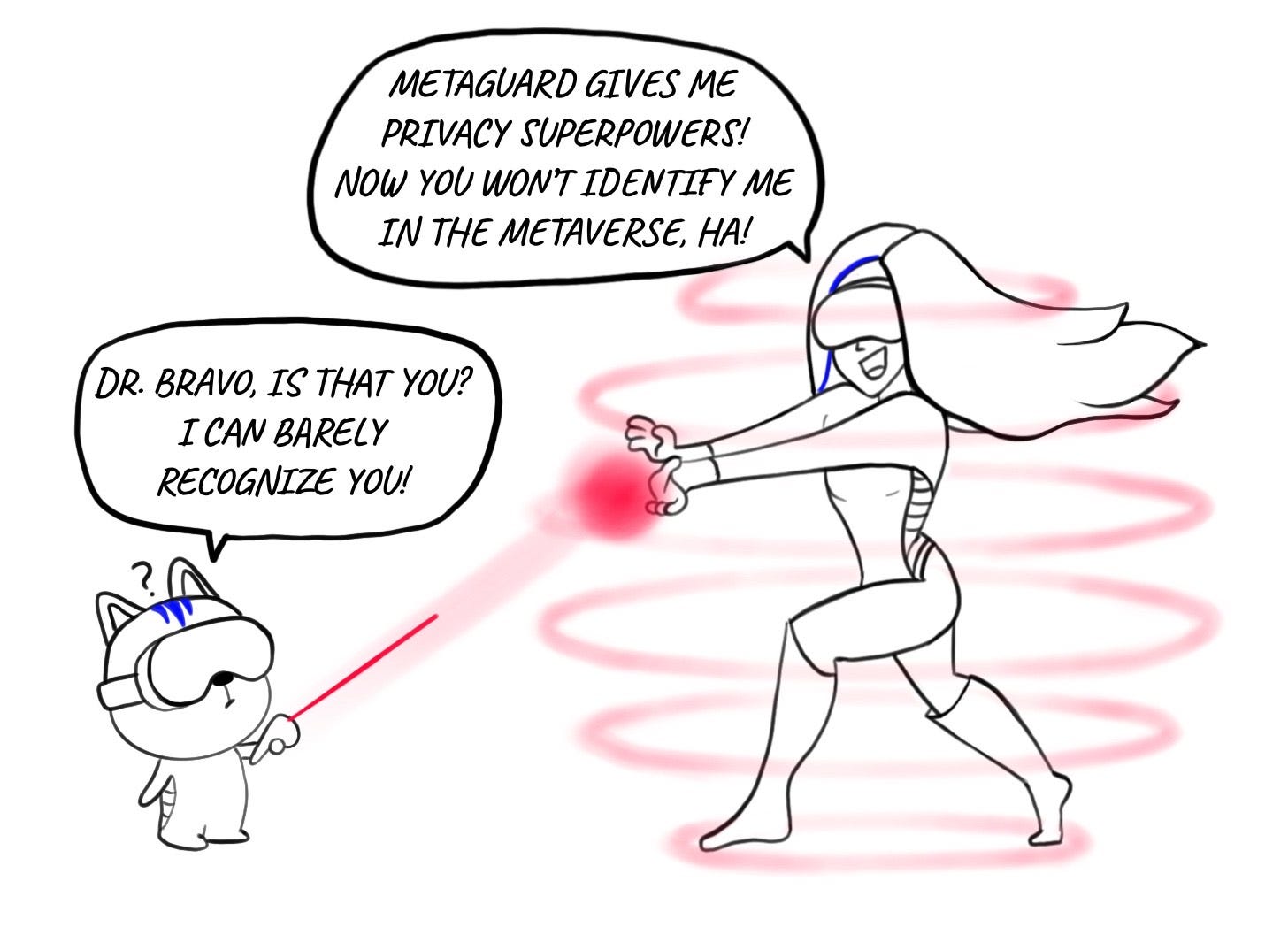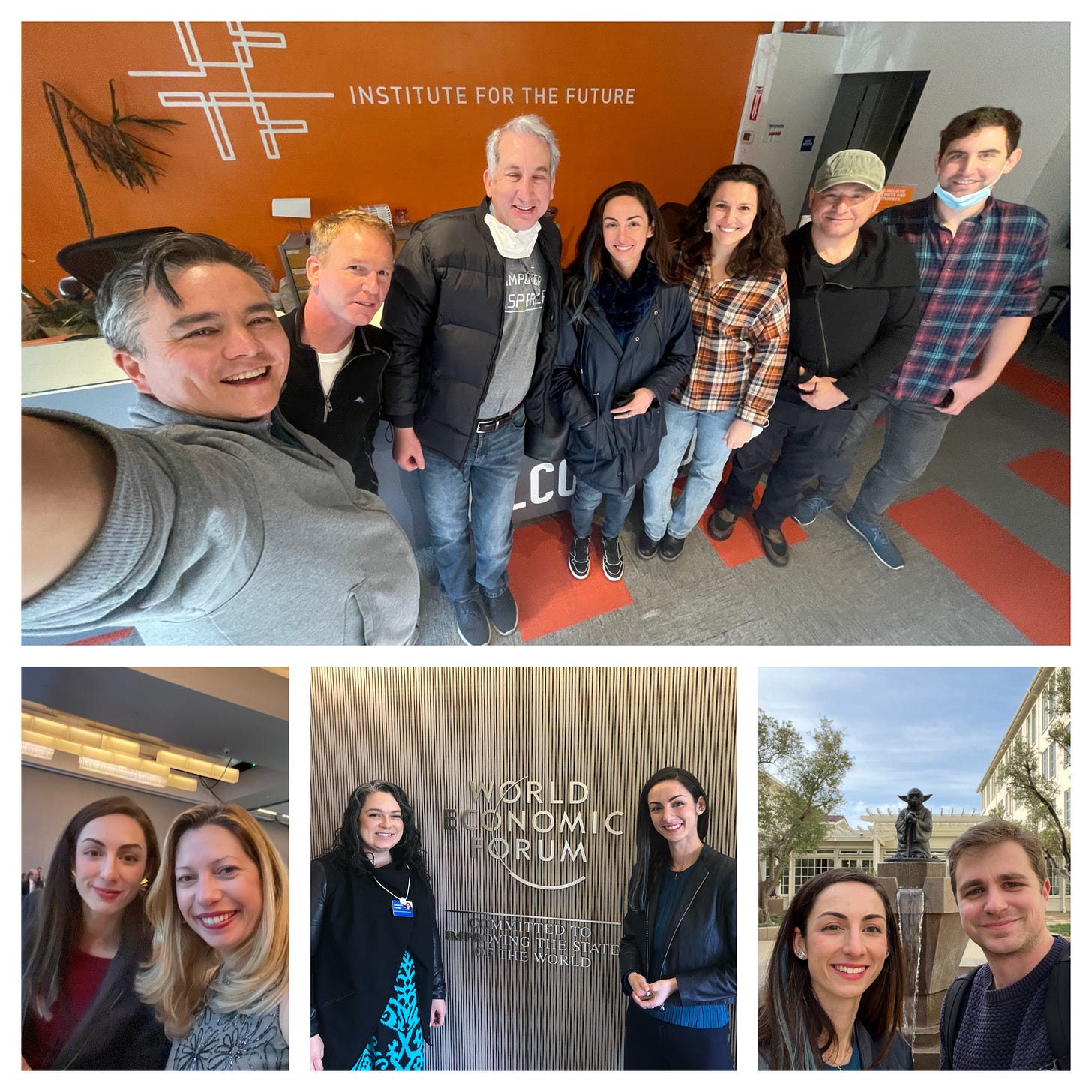⏳ 5 min read
Hold on to your VR headsets and get ready for some serious metaverse power!
This edition unveils a metaverse superpower that's a must-have for every virtual explorer out there. It's time to level up your data protection game in the uncharted territory of the metaverse.
Introducing MetaGuard—a VR plug-in for safeguarding your identity and data while you immerse yourself in the wonders of VR. 🔥
Developed by researchers Vivek Nair and Dawn Song from UC Berkley (US) and Gonzalo Munilla Garrido from the Technical University of Munich (Germany), this plug-in gives the power back to the user. It´s a research tool that allows us to choose the level of privacy desired in a VR application. The power of privacy is back in our hands!
Below, I briefly describe their amazing research: "Going Incognito in the Metaverse." Here, I refer to the metaverse as a vision for the next wave of computing that is ubiquitous, seamless, and immersive—making use of AR and VR technologies.
Why should we care about going incognito?
“Data is the new oil,” and companies monetize their users’ data to generate revenue.
As users, we should become aware of how our data is used by tech platforms. And even more in the metaverse, where sensitive data such as biometrics or our behavioral blueprint can be collected.
💡 Curious to know more? Check MDE#02 Data Privacy.
On the web, we have several measures to protect our privacy. One measure is via regulations. For example, third-party tracking cookies that generate privacy and security concerns have been regulated in the EU via the General Data Protection Regulation (GDPR). Other defensive measures involve the use of VPNs, proxies, and private browsing. Check Tor Project, Brave, or the total cookie protection from Firefox. Plus, there are search engines that do not track, such as DuckDuckGo.
The main difference between data privacy on the web and in AR/VR technologies is the amount of data collected quickly and the accuracy of inferring users´ data. By collecting enough AR/VR sensor data, companies can create a digital and behavioral blueprint of a person.(See MDE#02.)
We lack solutions and regulations to protect privacy and security specifically targeted to AR/VR technologies. By the time specific regulations for AR/VR come up, the space will be populated by applications tracking users’ data.
Until then, there is no time to waste: let’s go incognito!
Going incognito in the metaverse
When I first heard about MetaGuard, it reminded me of Project Alias, an award-winning device to protect users’ privacy with AI home assistants, from designers Bjørn Karmann and Tore Knudsen.
The device is placed on top of the AI speaker and acts as a parasite: it generates white noise to ensure privacy and offer customization options. For example, you can rename your AI assistant to be unique to you—“Tom” instead of a predefined name—to assist you with your home duties, ha! ;-)
MetaGuard is similar. It protects the user by “intelligently adding noise when and where it is needed most to maximize privacy while minimizing usability impact.” In other words, MetaGuard acts as a middleman between the users’ data and the VR software to ensure privacy.
The great advantage of MetaGuard is protecting users from identification. The metrics gathered by the study indicate a 94.6-96.0% degradation in identifying VR users. This point is fundamental as a recent study from the same authors demonstrates that a single VR user can be identified within a pool of 50000 users.
You’d better start taking privacy seriously in the metaverse!
How does MetaGuard work?
MetaGuard is a Unity plug-in that prevents attacks at the software level. It uses local differential privacy to achieve three different levels of privacy: low, medium, and high.
Heads up! There is a trade-off between data privacy and accuracy: the more accurate you want your data to be, the less privacy you can have.
Take the popular game BeatSaber, for instance—it requires a ton of data to be collected per second to keep up with the fast-paced, competitive gameplay. Applying a high privacy setting here would severely impact the amount of data sent back to the game, ultimately compromising the user experience. So, while it's important to prioritize privacy, sometimes we need to make a trade-off to ensure the best possible user experience.
With MetaGuard, the data harvested by the VR application is less accurate because it protects the user's privacy. The results from the study indicate that when it is turned on, there is a significant accuracy drop in predicting gender (-23.5%), age (-58.25%), ethnicity (-48.75%), and income (-73.85%). And a 94.6-96.0% degradation in identifying VR users.
So, what can we do?
Protect your identity and privacy by checking the plug-in below. Disclaimer: it’s currently a research prototype. You can experiment by downloading it here:
💥 MetaGuard Unity plug-in GitHub
You can also try Project Alias if you own an AI home assistant. And if you know somebody who owns one, share this newsletter. Now ;-)
💥 Project Alias step-by-step tutorial and Project Alias 2.0 GitHub
Don’t delay, do it today. 🚀
Bye for now!
News of the past month: what an amazing time in San Francisco! I had the pleasure to give a talk at SPIE AR|VR|MR about the responsible angle when shaping hardware and optics for AR/VR.
Plus, I had the pleasure to meet amazing AR/VR innovators during my trip, join some activities of the XR Guild and enjoy the great California vibes! 😎
Just click below 👇 to keep updated on the next ones. I am looking forward to having you as part of this expanding community.







